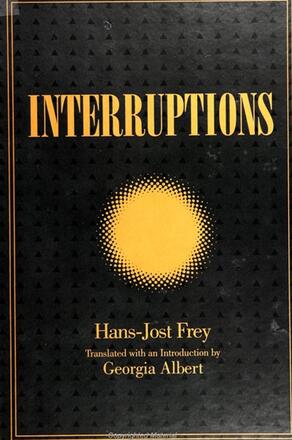
Interruptions
Alternative formats available from:
This untraditional text is a series of parables, allegories, and prose poems that reflect on the problem of the fragment. Studying the fragment lays the theoretical ground for the basic question of where a text begins and ends.
Description
Interruptions is a highly original book which refuses characterization as either literature or theory. Hans-Jost Frey explores the problem of the fragment both from a more traditional critical perspective, discussing the peculiar status of the fragmentary text in literary studies, and in a performative or exemplary way through fictional texts and short meditations. In its forays beyond the narrower realm of literary criticism, Frey addresses in turn such crucial issues as the law, personal history, death, and the constraints of understanding, revealing in each case the fundamental role the fragment plays in them.
Hans-Jost Frey is Professor of Comparative Literature at the University of Zurich.
Reviews
"This extraordinary book belongs in the company of Friedrich Schlegel's Athenaeum Fragments, Nietzsche's The Gay Science, Blanchot's Le pas au-dela`, and Kafka's diaries, aphorisms, parables, and stories. In its laconic rigor, Interruptions is the best book on the fragment and on living fragmentarily. Just as a good book on irony cannot escape being ironical, so a good book on the fragment must be fragmentary. Interruptions starts and then stops, again and again, breaking off continually where there is no more to say and too much more to say. Georgia Albert's admirable translation matches the original in spare elegance and scrupulous rigor. Only occasionally, as is proper, does the translation break off or break down in the face of untranslatable word play in the original. Albert's splendid introduction fulfills Friedrich Schlegel's stipulation for a preface: 'A good preface must be at once the square root and the square of its book. '" — J. Hillis Miller, University of California, Irvine